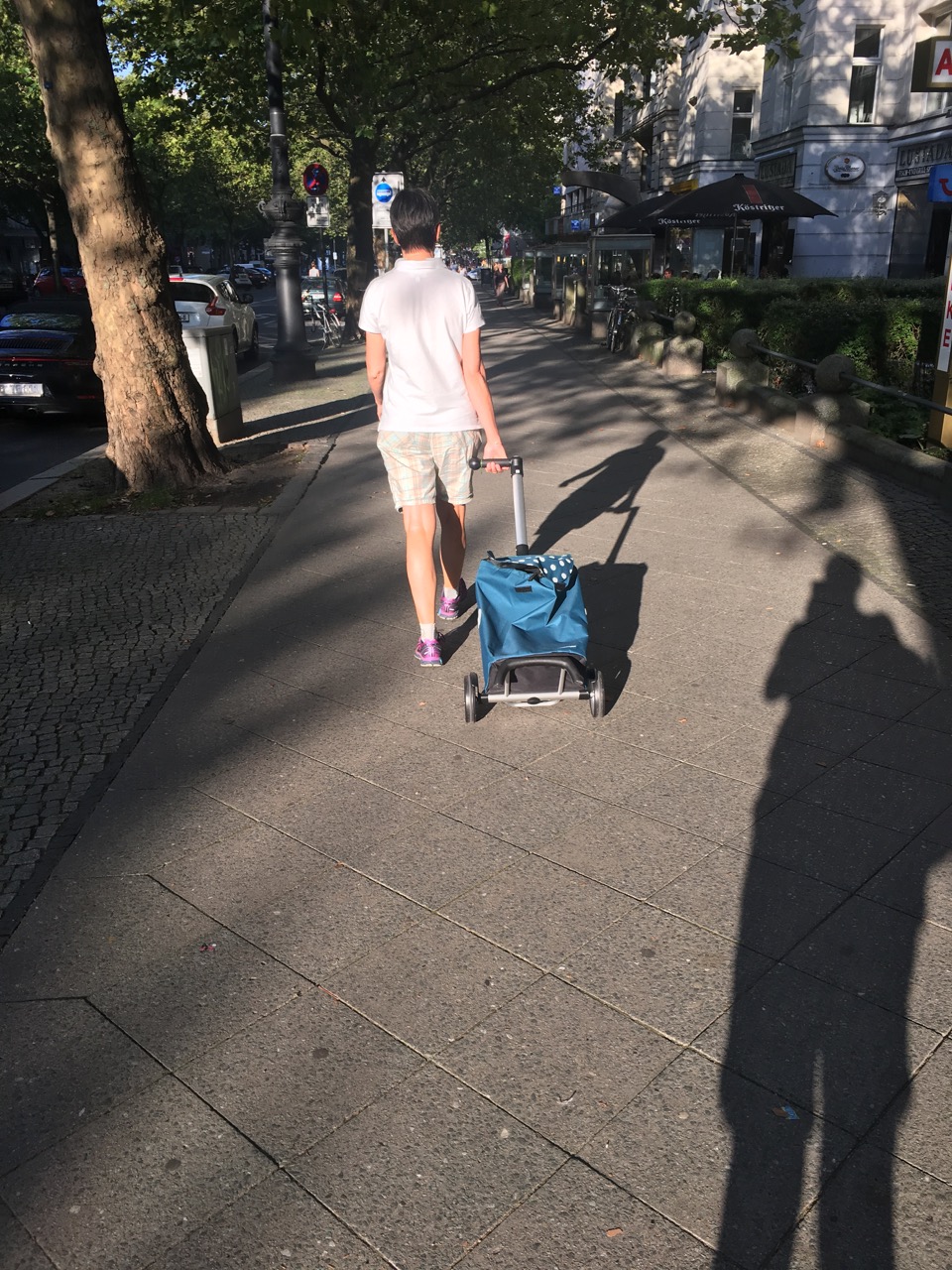Day 1: Figure out transportation to work, because bike is in the shop getting its fenders put on. One does not ride around Berlin most times of year without fenders, lest a damp bottom upon arrival.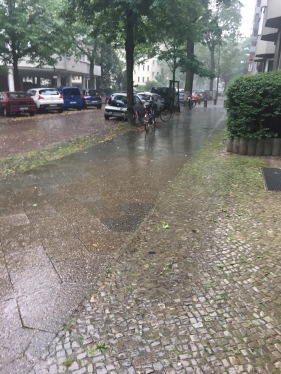
So the bus it is. It is only 2 blocks away from our flat and runs frequently. We rarely ride buses in the US, unless in a large city, as they are usually not convenient or timely. This is not the case here. There are many choices with two train lines, U-Bahn and S lines, and many buses. Las Chicas ride together to take care of some business today.

It’s a pleasure to not be locked in a car driving everywhere. A definite highlight here.
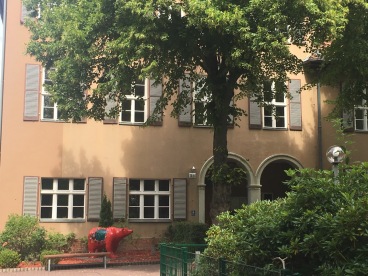
We arrive at BIS and after a brief “Meet and Great”, things quickly get more real. Health insurance is the first topic. An absolute requirement in Germany, and quite expensive. No private healthcare option, for 80 euros monthly for both chicas, like in Spain. Instead Lisa’s age is front and center. In fact, she receives a special email the night before from the school director alerting her about some challenges related to her coverage. Remember pre-ACA in the US, when companies could refuse you coverage or make you pay large sums to be covered? Berlin has been inundated with newcomers, expats and refugees in recent months and years which are taxing the public systems, hence the closer scrutiny of each individual upon arrival.
We are escorted to a separate room to discuss coverage. Mary breezes through with her EU passport in hand. I am not so lucky, and listen to a pessimistic presentation from the insurance frau with comments like, “…if I can find someone to insure you…”. It’s a new experience and one that is not easily resolved. Patience and positive attitude. The uncertainty hangs over the day.
Next onto the Bürgeramt Zehlendorf , “Citizens offices”, in the Town Hall for me. Mary heads off on a bike ride, before settling into her split shift work day.
Step 1, we need to register our residence, before we can: get a local phone number (even a prepaid number requires your passport), bank account and certainly before any further steps with immigration.
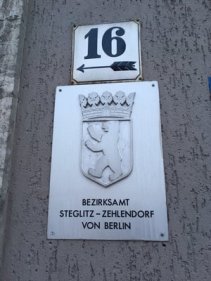
The place is more similar to immigration appointments in Barcelona, not like the quick walk-in service in Sarría, Barcelona, where we registered our address. Luckily appointments are scheduled ahead of time, so we pass by the long line waiting at the Information Desk. (But Mary will not be so lucky later in the week when she has to return to sign additional paperwork.)
Having an employer, who supports you in this process is a HUGE advantage when moving to another country. I am very thankful for my teaching credentials at these moments.

Mary waits with others for the Information Desk to open
We watch the digital cue for our number to appear, in a large room filled with people of all ages from around the world. Lisa’s number is the first in the group. She proceeds to a desk, with her German translator from school, to show passports and the official letter from the landlord proving we have an address here in Berlin. The process is quick and efficient, and similar to BCN there is a 13 euro charge for processing the paperwork. Success. Then we wait for the other 5 teachers to finish. Waiting is a regular part of the expat life, especially early in your stay.
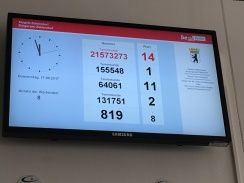
Digital cue with many colors and types of numbers.
It takes about 2 hours and we still have to wait for our next appointment, as we are early. Our group arrives at the bank and is greeted by bankers who take us in pairs to different offices and offer us refreshment.
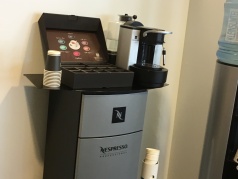
Mary is tempted by the Nespresso machine in the bank lobby later in the week.
Setting up an account is similar to setting up an account in the US, but it takes 3 times longer, does not require any money be deposited (perhaps because we will have direct deposit from our work), and there are volumes of paperwork. Apparently Germany is noted for their continued love of paperwork vs. digital processing.
And so we sit patiently. Luckily Dominic, the cute young banker, does mine first. Craig, the other teacher, gets to sit through the 45 minutes it takes for mine and then begin his process. He too is practicing patience as his Chinese wife is yet to secure a visa. We are most fortunate.
The work day ends at the bank and I board the bus home, with 2 of 3 tasks complete. The health insurance saga will continue through the week. The Director assures me we will find a viable solution. Meanwhile I get an email from the insurance frau. She has found a policy for 981 euros a month (this is 3 times what I expected to pay), with a 900 euro deductible and lots of other language I can not read in German, and 8 lengthy forms attached, including the forms for a physical and dental exam. My heart sinks a bit.
There are additional sessions at school this week, what you might expect of an orientation: overview of the school resources, handbook, tour of the school, and a speaker on transition. We also had a similar presentation about transition or “culture shock” when we moved to Barcelona. It is common that people go through some sort of cycle similar to the one below. Beginning with a “honeymoon period” and then meeting difficult challenges, sometimes with anger, other times with overwhelm, we finally emerge with some level of “integration”. So far the initial steps have gone a little more easily than our transition to Spain, but beware, this still might be the honeymoon period.
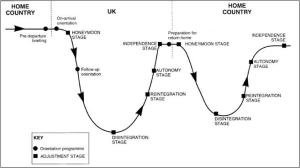
There are several more official steps and paperwork to complete throughout the week. Later in the week, Lisa is relieved when the Director finds a way, with help of creative team members, to include her in the state healthcare system offered to the rest of the teachers. The representative from school is able to get our tax numbers. Note: We will pay substantial taxes here in Germany. But like Spain, Germany has a tax treaty with the US that allows the retirement portion of these funds to transfer and be included in one’s social security payments. It is unclear about the remainder of the taxes and if we will receive any refund at the end of the year. A calculated risk.
Sometime during the week we receive a much needed, heartwarming photo of our cat, left behind in the US, but clearly doing well. Hello Mr. Gray, we miss you!
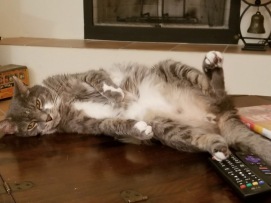
We also take a break to meet some new friends for dinner in Kreuzberg at the Marheineke Markthalle. We met them the week before, during our visit to Schöneberg. Originally from the US, they too are new to Berlin, although they have lived in Munich for four years. We purchase food from different vendors, Lisa from the Greek stand and the others from the vegetarian restaurant.
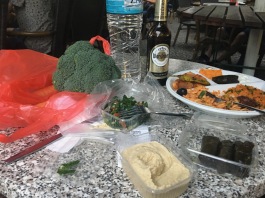
Outside of school we are also becoming experts at Google maps, including the “details” feature that shows each and every stop on transit, …
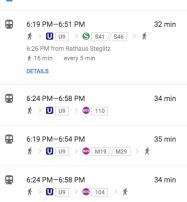
and Google Translate. We comment, way too often, “How did people do this before…”. We especially love the camera option, as all the manuals are in German. The camera option allows you to scan the document with your camera as it translates, about 50% of the words. It’s amazing how much you can understand knowing at least 50% of the content. Keep that in mind teachers!
Fancy German dishwasher instructions to be translated
We awake every morning knowing it’s a new day, and preparing ourselves to embrace the unknown once again. The speaker on transition mentioned that sleeping is generally not a problem for new arrivals in these early days, weeks and months, as the process can be quite exhausting. Hear, hear!
We are slowly, word by word, beginning to build some vocabulary in German. It’s amazing to see what you can understand when you know the context.
Kicher Erbsen = chickpeas, Baby Spinat = baby spinach
Now you are learning German too!
©2017 Lisa Howells and Mary Reynolds

